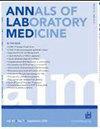Clinical Utility of Monitoring Circulating Tumor DNA Using a Targeted Next-generation Sequencing Panel in Patients with Colorectal Cancer.
IF 3.9
2区 医学
Q1 MEDICAL LABORATORY TECHNOLOGY
引用次数: 0
Abstract
Background Circulating tumor DNA (ctDNA) profiling from peripheral blood allows relatively noninvasive monitoring of solid tumors; however, its utility post-surgery or chemotherapy in colorectal cancer remains underexplored. We evaluated the clinical implications of a ctDNA next-generation sequencing (NGS) panel post-surgery or chemotherapy in patients with colorectal cancer. Methods We collected samples from 23 patients with colorectal cancer (17 men, median age 65 yrs) at baseline and post-surgery or chemotherapy at the National Cancer Center, Korea, between January 2021 and September 2023. ctDNA was analyzed using an NGS panel including 46 genes, and variant allele frequencies (VAFs) were determined. Follow-up samples were analyzed using the NGS panel or droplet digital PCR (ddPCR) when probes were available. Clinical status was compared with ctDNA results, and survival was analyzed using a time-dependent Cox model. Results Mutations were identified in 13 out of 14 patients (92.8%) with stage II/III cancer and in all nine patients (100%) with stage IV cancer. Mutations were detected in KRAS (N=15, 65%), APC (N=8, 35%), TP53 (N=7, 30%), PIK3CA (N=5, 22%), and RET (N=4, 17%). A 1% increase in KRAS and TP53 VAFs was associated with 48% and 32% increased mortality risk, respectively. Changes in VAF correlated well with clinical findings. Conclusions The detection of and an increase in KRAS and TP53 VAFs were associated with poor prognosis. ddPCR-based ctDNA monitoring results were comparable to those obtained with the NGS panel. ctDNA monitoring during treatment is clinically informative in managing colorectal cancer.使用靶向新一代测序面板监测结直肠癌患者循环肿瘤DNA的临床应用
来自外周血的循环肿瘤DNA (ctDNA)谱分析允许对实体肿瘤进行相对无创的监测;然而,它在结直肠癌手术或化疗后的应用仍未得到充分探索。我们评估了ctDNA下一代测序(NGS)面板在结直肠癌患者手术或化疗后的临床意义。方法:我们收集了2021年1月至2023年9月期间在韩国国立癌症中心基线和术后或化疗期间的23例结直肠癌患者(17名男性,中位年龄65岁)的样本。采用包含46个基因的NGS面板分析ctDNA,并确定变异等位基因频率(VAFs)。在有探针的情况下,使用NGS面板或液滴数字PCR (ddPCR)分析后续样品。将临床状态与ctDNA结果进行比较,并使用时间依赖的Cox模型分析生存期。结果14例II/III期癌症患者中有13例(92.8%)发现了突变,9例IV期癌症患者中(100%)发现了突变。KRAS (N=15, 65%)、APC (N=8, 35%)、TP53 (N=7, 30%)、PIK3CA (N=5, 22%)和RET (N=4, 17%)检测到突变。KRAS和TP53 VAFs每增加1%,死亡风险分别增加48%和32%。VAF的变化与临床表现密切相关。结论VAFs中KRAS和TP53的检测及升高与预后不良有关。基于ddpcr的ctDNA监测结果与NGS面板获得的结果相当。治疗期间的ctDNA监测对结直肠癌的治疗具有临床参考价值。
本文章由计算机程序翻译,如有差异,请以英文原文为准。
求助全文
约1分钟内获得全文
求助全文
来源期刊

Annals of Laboratory Medicine
MEDICAL LABORATORY TECHNOLOGY-
CiteScore
8.30
自引率
12.20%
发文量
100
审稿时长
6-12 weeks
期刊介绍:
Annals of Laboratory Medicine is the official journal of Korean Society for Laboratory Medicine. The journal title has been recently changed from the Korean Journal of Laboratory Medicine (ISSN, 1598-6535) from the January issue of 2012. The JCR 2017 Impact factor of Ann Lab Med was 1.916.
 求助内容:
求助内容: 应助结果提醒方式:
应助结果提醒方式:


